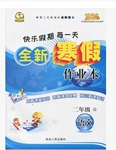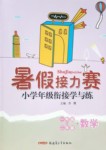题目内容
I told my friend Graham that I often cycle the two miles from my house to the town center but unfortunately there is a big hill on the route. He replied, ‘You mean fortunately.’ He explained that I should be glad of the extra exercise that the hill provided.
My attitude to the hill has now changed. I used to grumble as I approached it but now I tell myself the following. This hill will exercise my heart and lungs. It will help me to lose weight and get fit. It will mean that I live longer. This hill is my friend. Finally as I wend my way up the incline I console myself with the thought of all those silly people who pay money to go to a gym and sit on stationery exercise bicycles when I can get the same value for free. I have a smug smile of satisfaction as I reach the top of the hill.
Problems are there to be faced and overcome. We cannot achieve anything with an easy life. Helen Keller was the first deaf and blind person to gain a University degree. Her activism and writing proved inspirational. She wrote, “Character cannot be developed in ease and quiet. Only through experiences of trial and suffering can the soul be strengthened, vision cleared, ambition inspired and success achieved.”
One of the main determinants of success in life is our attitude towards adversity. From time to time we all face hardships, problems, accidents, afflictions and difficulties. Some are of our making but many confront us through no fault of our own. Whilst we cannot choose the adversity we can choose our attitude towards it.
Douglas Bader was 21 when in 1931 he had both legs amputated following a flying accident. He was determined to fly again and went on to become one of the leading flying aces in the Battle of Britain with 22 aerial victories over the Germans. He was an inspiration to others during the war. He said, “Don’t listen to anyone who tells you that you can’t do this or that. That’s nonsense. Make up your mind, you’ll never use crutches or a stick, then have a go at everything. Go to school, join in all the games you can. Go anywhere you want to. But never, never let them persuade you that things are too difficult or impossible.”
The biographies of great people are littered with examples of how they took these kinds of steps to overcome the difficulties they faced. The common thread is that they did not become defeatist or depressed. They chose their attitude. They chose to be positive. They took on the challenge. They won.
The writer has a smug smile of satisfaction as he reaches the top of the hill because .
A.he was actually killing two birds with a stone
B.compared with those silly people, he was smarter
C.he lost weight by cycing to the town center every day
D.he was informed of a short route from his house to the town
The writer quoted Helen Keller and her saying as an example to demonstrate .
A.one cannot achieve anything with an easy life
B.only disabled persons can experience hardship deeply
C.one’s success is determined by nothing but his / her attitude
D.it’s rare for a deaf and blind person to gain a University degree.
From this passage we know that Douglas Bader was a person of .
A.individual and creative character B.stubborn yet charming personality
C.great bravery and strong will D.excellent speaker with great influence
In writing style, the last paragraph serves as .
A.an explanation B.a demonstration
C.an introduction D.a summarization
【小题1】A
【小题2】A
【小题3】C
【小题4】D
解析:
略

 桃李文化快乐暑假武汉出版社系列答案
桃李文化快乐暑假武汉出版社系列答案 优秀生快乐假期每一天全新寒假作业本系列答案
优秀生快乐假期每一天全新寒假作业本系列答案 暑假接力赛新疆青少年出版社系列答案
暑假接力赛新疆青少年出版社系列答案College is a big deal for American students as well as for Chinese students. During the college __41__, some parents become extremely worried. This may only __42__ the pressure.
Before I applied to the college, I told my parents I would get everything __43__ out. If I needed any help, I promised that I would ask them.
As it __44_ out, I had no problem putting everything together on my __45__, including my resume(履历) and a basic outline of my activities in high school. The __46__ part where I asked for my parents' advice was the essays. In writing and revising the essays, I needed feedback(反馈) from an audience. As my parents know me better than __47__ else, they were __48__for the job.
The essays are extremely important in college admissions. In a competitive pool of applicants, the test scores and activities, as well as the recommendations are all going to be very __49__. The essays are the one area in which students can make themselves stand __50__. Essays don't have to be big and complicated. I wrote three essays, all __51__ on small matters and using simple sentences. The admission officers have to read hundreds of essays a day; they are already __52__ of SAT vocabularies and long sentences. __53__, a straightforward writing style is refreshing to their eyes as well as their minds. Essays were the key to my success in the admission game. I just wrote about what I wanted to say, not what I thought the admission officers __54__ to hear.
In my main narrative-style __55__, I told the story of my American journey at the age of 14. During that time, I was not bogged down(陷入) by trying to fit into a new __56__; instead, I looked up to Mother Teresa for guidance and strength. I found my new __57__ and grew to love the name Teresa and the memories it held.
In my two minor essays, I __58__ the major events of my life, why I loved writing and why my dad is the person who has the greatest influence on me. Both provided details of my character. The essay about writing, which is titled, “I Shall Not Live in Vain” (__59__ by an Emily Dickinson poem), earned a lot of praise.
It is __60__ I really looked into my heart and thought deeply in order to reach my answers.
| 【小题1】 |
|
| 【小题2】 |
|
| 【小题3】 |
|
| 【小题4】 |
|
| 【小题5】 |
|
| 【小题6】 |
|
| 【小题7】 |
|
| 【小题8】 |
|
| 【小题9】 |
|
| 【小题10】 |
|
| 【小题11】 |
|
| 【小题12】 |
|
| 【小题13】 |
|
| 【小题14】 |
|
| 【小题15】 |
|
| 【小题16】 |
|
| 【小题17】 |
|
| 【小题18】 |
|
| 【小题19】 |
|
| 【小题20】 |
|
 e about it anymore. As I leaned uneasily toward the mirror, I felt a sudden 54.
e about it anymore. As I leaned uneasily toward the mirror, I felt a sudden 54. D. disappointed
D. disappointed so D. but
so D. but